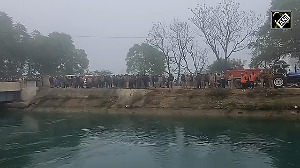 The Supreme Court on Wednesday refused to entertain the bail plea of sacked Uttarakhand minorities panel chief Sukhdev Singh Namdhari, accused in a 2012 shootout in New Delhi that killed liquor baron Ponty Chadha and his brother Hardeep, saying charges against him were "grave".
The Supreme Court on Wednesday refused to entertain the bail plea of sacked Uttarakhand minorities panel chief Sukhdev Singh Namdhari, accused in a 2012 shootout in New Delhi that killed liquor baron Ponty Chadha and his brother Hardeep, saying charges against him were "grave".
"We are not interested in entertaining the petition. The charges against you are grave," a vacation bench comprising Justices P C Ghose and Amitava Roy said.
The apex court took strong note of the fact that Namdhari earlier secured interim bail on health grounds from the trial court during the pendency of his regular bail plea in the Delhi high court.
"It is strange. The trial court grants you interim bail when the bail petition is pending in the high court," it said.
Namdhari, in his plea before the apex court, said he was not keeping well and hence be enlarged on bail during the pendency of trial.
In April this year, the trial court, which is currently recording prosecution evidence in the case, has cancelled the interim bail of Namdhari and sent him to jail.
The trial court, while cancelling the interim bail, had said the main complainant, Nandlal Mahto, had turned hostile in the matter and it could not be ruled out that Namdhari had threatened him or given him gratification to turn hostile.
The plea seeking cancellation of Namdhari's interim bail was filed by wife of Hardeep in the trial court.
Namdhari, the alleged main conspirator in the case, was granted interim bail on November 27 last year on medical grounds which was extended time to time.
The accused had said that he was suffering from various ailments like hepatitis C, blood pressure and heart problems apart from depression and having suicidal tendencies.
Ponty and Hardeep, who were allegedly involved in a property dispute, were killed in a shootout at a Chhattarpur farmhouse in New Delhi on November 17, 2012. Subsequently, Namdhari was arrested on November 23, 2012. Later, the remaining accused were apprehended.
The trial court in July last year had framed charges under section 302 (murder) read with section 149 (offence committed by member of unlawful assembly) of the IPC against all the 21 accused, including Namdhari and his personal security officer Sachin Tyagi.
On January 28, 2014, the trial court had dropped murder charges against all the accused and added the charge of culpable homicide not amounting murder under section 304 of IPC against Namdhari and Tyagi.
On May 15 last year, on the plea of police, the Delhi high court had overturned the trial court's decision and directed framing of murder charges against all the 21 accused. The apex court had also upheld the high court's decision.
Ponty and Hardeep were also charge sheeted in the case. However, the trial against them had abated as they were killed in the shootout.
The court had ordered framing of criminal conspiracy, common intention and those under the arms act against all the 21 accused for trying to take over the disputed farmhouse from the possession of Hardeep.
The Delhi Police had filed two charge sheets in the case and levelled murder charges against all the accused. The first charge sheet had named Ponty as an accused as he had reached the place of the incident with Namdhari and others as part of his "well-hatched conspiracy" to take possession of the south Delhi farm house.
In the supplementary charge sheet, the police had accused Hardeep in the case, saying the probe had shown Ponty was killed by the shot fired at him by his brother.










 © 2025
© 2025